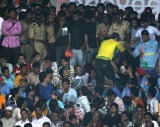
|

The message needs to go out to spectators that their involvement is not actually going to influence results for their team
© Getty Images
|
|
Spectator behaviour at cricket grounds has been a newsworthy topic for a while now.
The latest accusations have regarded racial taunts during the India versus Australia
series.
The cricket officials are right to be concerned, and with Muttiah Muralitharan
currently in Australia and in sight of Shane Warne's Test record, and
the Indian team due to arrive in the country a few weeks later, the controversy is
unlikely to abate.
There's no doubt a minority at the Australian grounds will taunt Muralitharan about
his action with calls of "no-ball" every time he bowls. And there's a saying in
Australia, "It's a racing certainty", which will apply to some sections of the crowd, who will see it as their "duty", at the matches against India, to return fire for the
alleged slurs directed at Andrew Symonds.
To a degree, politicians, officials and the players only have themselves to blame
for the trend towards jingoistic behaviour by cricket crowds. Last season Cricket
Australia encouraged crowds to turn up for the Ashes series and "go crazy in green
and gold". And it has become commonplace now for teams to "thank" the crowd by
applauding them when they do a lap of honour.
Generally most people in the crowd will take little notice of these pleas and thank
yous and will continue to behave in a way that is fit and proper. However, with
many politicians embracing overt patriotism, it's not surprising that some in the crowd will - especially when fuelled by alcohol - actually think they can help their
team by upsetting the opposition. With that seed having been planted, it's not
surprising players like Muralitharan and Symonds are being taunted.
In the days before marketing men produced slogans to encourage fans to attend games, and then organised loud music and inane commentary to be boomed out over the PA system, spectators had their own ways of baiting the opposition and helping the home team. It was acceptable then because it was either done with humour or without malice.
During the acrimonious Bodyline series, Stephen Harold Gascoigne, better known as
"Yabba", the famous Sydney Cricket Ground heckler, called out to the England captain Douglas Jardine as he swatted at a fly: "Leave our flies alone. They're the only friends you've got." In the West Indies, while the comedian Mac Fingal would belt out a rhythm on his drums at the Kensington Oval in Barbados, other members of his entourage would yell out practical cricket hints to the West Indies players as they battled the opposition.
 Last season Cricket Australia encouraged crowds to turn up for the Ashes series and "go crazy in green and gold". And it has become commonplace now for teams to "thank" the crowd by applauding them when they do a lap of honour
Last season Cricket Australia encouraged crowds to turn up for the Ashes series and "go crazy in green and gold". And it has become commonplace now for teams to "thank" the crowd by applauding them when they do a lap of honour
 |
In recent times crowds in the UK seem to be so preoccupied with fancy-dress attire
that all the attention is on what people are wearing rather than what they are
saying. And at the Premadasa stadium in Colombo the band plays long and loud and
the fans dance continuously, so they have little time to think up hurtful slurs; and
if someone in the crowd did call out, the players wouldn't hear them anyway.
It was always a dubious ploy to have players thank fans for their support. It
sends a clear message that people in the stands can actually help teams win, and this
is an open invitation for some to verbally "get involved in the game". Strange that
the same officials who encourage this ploy now make it almost impossible for fans
to get close to net practice before a day's play. This is one of the more practical
ways for fans to get close to the players and learn more about the game.
There have been some impassioned pleas from cricket administrators, but they have had little effect on the number of spectators taunting players; with all due respect, I doubt many people who attend cricket matches have read the ICC's Anti-Racism code.
Anti-social behaviour is not just a cricket problem, it's a crisis in society, and it
can only be solved by the proper education and good-example leadership on a global
basis. Meanwhile, cricket is beholden to do its bit to try and improve the situation and the best way forward may be to let the crowds entertain themselves. They do a better job of it than the marketing gurus, and it would certainly cut down on costs.

